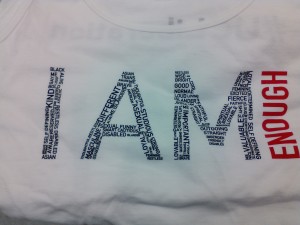[soundcloud id=’199952052′]
By Alyssa Hughes
During a discussion held by the organization METAS (Mentoring, Educating, and Training for Academic Success) and the “I Am Enough” Campaign, hall directors and students split into groups to discuss four myths and the truth about affirmative action.
“Affirmative action is very important,” said graduate student Roberto Valentin. “It’s very crucial to providing equity to all people in America.”

The panel on affirmative action held on Thursday was coordinated by the “I Am Enough” campaign and METAS. (Photo by Alyssa Hughes)
Amanda Torrellas, a sixth-semester allied science major led the discussion in the Puerto Rican Latin American Cultural Center last Thursday along with Alyssa Burgos, a sixth-semester business major.
The discussion focused on some of micro-aggressions of affirmative action, racial quotas and the idea of privilege.
Jillian Vazquez, a second-semester athletic training major said micro aggressions were like a “back handed compliment.”
Jesus Morales Sanchez, a second-semester Molecular and Cell Biology major said even though he put high expectations up for his self applying to college, people would always insist if he was enrolled it’d be because those schools needed more hispanics.
One student said affirmative action is necessary because it levels the playing field.
“The institutionalized inequalities that exist in this country are largely based on race,” Valentin said, not everyone has the same opportunities.
One of the four myths presented in the discussion was that affirmative action lets in more under qualified black students than qualified white students.
“What’s so hard about this myth for me is that even though it’s a myth,” said Aisha Folkes, a graduate student. “People of color still believe this.”
Jessica Liu, sixth-semester majoring in elementary education said she thinks a lot of people who join this campus don’t understand affirmative action.
“A lot of what we see that emerges from state institutions like UConn which are predominantly white institution is the lack of awareness and ignorance,” Valentin said. “Ignorance doesn’t mean that people are doing it in spite of others it’s the fact that they actually don’t know.”
Students said some of their experiences were not comfortable ones when the first enrolled.
Amy Hernandez, sixth semester Material science major who attended a 5-week program called Bridge prior to enrolling said some comments about racial quotas are contradicting.
“The whole idea about racial quotas goes against it’s own logic,” Hernandez said. “ If the school wanted to have x amount of minorities, they wouldn’t pick under qualified people because they wouldn’t stay there.”
Another example introduced into the discussion was the Supreme Court Case Fisher vs. University of Texas where a student accused the university of not accepting her because she was Caucasian.
Burgos asked the students to stand into a line for a game called the “Privilege Walk.”
Initially the group stood in a horizontal line and started at the same point. After they were asked a series of questions, either taking a step backwards or forwards, by the end of the questions, where they stood, determined their privileges.
The goal of the discussion was to educate students on myths on affirmative action provide ways for them to respond to micro-aggressions.
“You’re not enough, you’re beyond enough,” Sanchez said.

